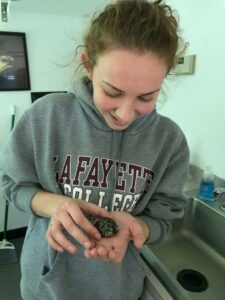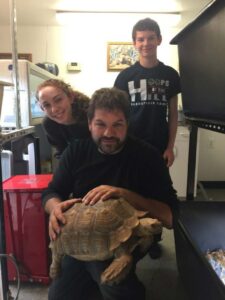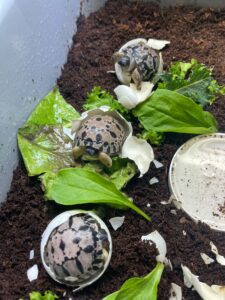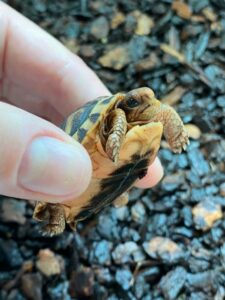A key member of the tortoise rescue team
With a sanctuary for them in the basement of her house, endangered tortoises were a big part of childhood for Olivia Sterantino ’23. Her father had started rescuing and breeding the animals after college.
“When he met my mom, they bought a house,” she says. “He had a sulcata tortoise, Howard, and a bunch of star tortoises. He was raising those, and when I was born—I’m the oldest in my family—he sold all of them except Howard. So I grew up with a tortoise in my yard in the summer, and then in the winter he would go in the basement.”
When she was in high school, Olivia helped her father as he restarted his rescue and breeding efforts. He earned a license and had his basement accredited by the American Zoo Association. They began breeding other species like endangered radiated tortoises from Madagascar and bowsprit tortoises from South Africa.
Father and daughter worked in association with Trevor Zoo at Millbrook School in Millbrook, N.Y., a boarding school focusing on biological studies and zoology with its own on-campus zoo.
“So if he, for example, wants a tortoise from the Oklahoma zoo to breed with his tortoise, he can use his affiliation with the Trevor Zoo to trade and work with zoos all around the U.S.,” she explains.
Olivia recalls hatching their first tortoise, after which she got closely involved with the work. She also remembers waking up late at night to go to the airport to help her dad transport tortoises, then going home and back to school the next morning.
“I went on ecological surveys and saw the data and the processes behind breeding an endangered species,” she says, “and then actually saw the results when the tortoises hatched!”
In the absence of her dad, Olivia was left in charge of the project, which included tasks like marking nests and excavating eggs.
That responsibility was a lot because if I missed an egg outside or if a turtle flipped over and I didn’t catch it, they could die,” she says.
With times when she and her dad had to inject the tortoises to cure a disease or scrub antibiotics and iodine solutions on their shells, taking care of them also required her to learn about their biology. This education as well as the sheer mesmerizing sights of nature, such as watching a tortoise hatch from an egg, made the entire experience extremely fulfilling.
Furthermore, the shared experience facilitated a strong bond between Olivia and her father, who became a mentor.
“Just watching him with the research and figuring out the problems and then him explaining to me why they’re [tortoises] like this and the temperature in the night drops in South Africa and how we needed to replicate that and experiment at home was so interesting,” she says.
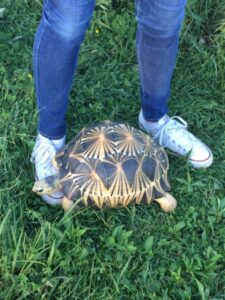 While the job was not too time-consuming, Olivia says, there definitely were stressful times, especially when she was left alone in charge.
While the job was not too time-consuming, Olivia says, there definitely were stressful times, especially when she was left alone in charge.
“For example, when a female was nesting, if she saw you, she would stop nesting,” she says. “But I had to watch because if you lose the nest, the babies are gone because they’re outside, and we can’t put them in the incubator. So I would have to hide behind a bush and watch.”
Olivia is majoring in environmental science, a decision largely inspired by her work with her dad.
“It was a really amazing experience and showed me how big of a difference one person can make,” she says.
